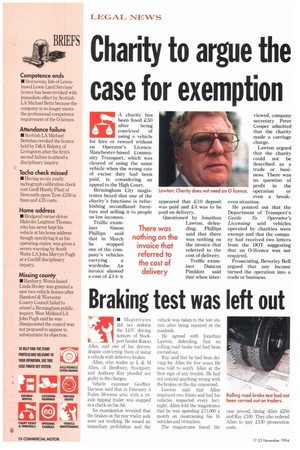Charity to argue the case for exemption
Page 20

If you've noticed an error in this article please click here to report it so we can fix it.
A charity has been fined £50
after being convicted of using a vehicle for hire or reward without an Operator's Licence. Manchester-based Community Transport, which was cleared of using the same vehicle when the wrong rate of excise duty had been paid, is considering an appeal to the High Court.
Birmingham City magistrates heard that one of the charity's functions is refurbishing secondhand furniture and selling it to people on low incomes.
Traffic exam iner Simon Phillips said that in March he stopped one of the company's vehicles carrying a wardrobe. An invoice showed a cost of £14: it appeared that £10 deposit was paid and £4 was to be paid on delivery.
Questioned by Jonathan Lawton, defending, Phillips said that there was nothing on the invoice that referred to the cost of delivery.
Traffic examiner Duncan Pimblott said that when inter viewed, company secretary Peter Cooper admitted that the charity made a carriage charge.
Lawton argued that the charity could not be described as a trade or business. There was no question of profit in the operation or even a breakeven situation.
He pointed out that the Department of Transport's Guide To Operator's Licensing said vehicles operated by charities were exempt and that the company had received two letters from the DOT suggesting that an 0-licence was not required.
Prosecuting, Beverley Bell argued that any income turned the operation into a trade or business.






















































































































